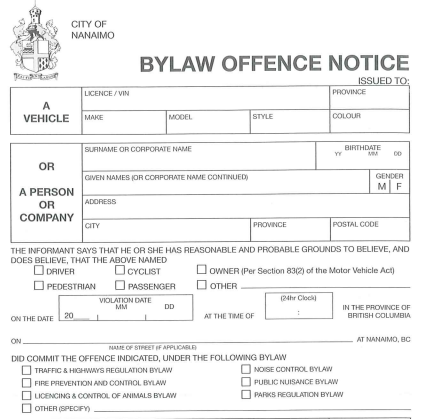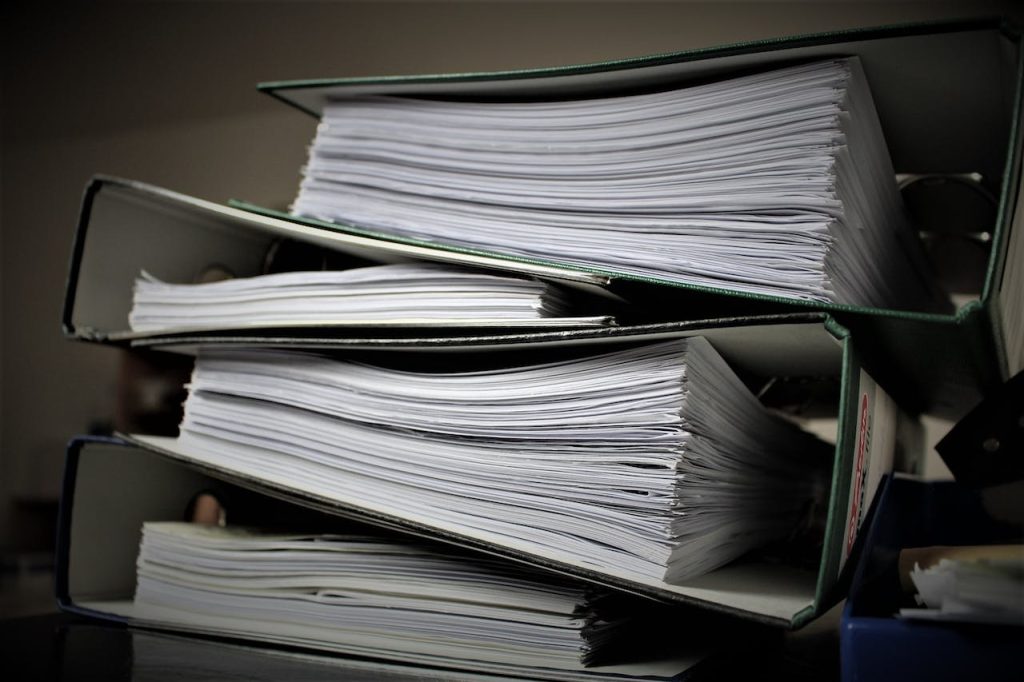I represent a local government
How to join the program
- Local government passes a bylaw that:
- Designates bylaw violations that may be dealt with by a Bylaw Notice and the amount of the penalty for each violation
- Establishes the period for paying or disputing a Bylaw Notice
- Establishes a Bylaw Notice dispute adjudication system to resolve disputes in relation to Bylaw Notices
- The local government emails its request to be added to the Bylaw Adjudication Program with a link to its LGBNEA bylaw to: LocalGovernmentBylawAdjudication@gov.bc.ca
- Local government requests are processed three times a year for program onboarding. Processing times range from 2 to 4 months, depending on volume and complexity.
- The Tribunal and Agency Support Division (TASD) receives and reviews the request. TASD completes the rest of the process (pursuant to LGBNEA, s. 2(1)) and contacts the local government when it is complete.

Implementing an adjudication system
Once enrolled in the program, the local government can develop and implement an administrative system for enforcing and disputing simple bylaw infractions with penalties up to $500. Bylaw notices can be disputed through the administrative system and heard by an independent adjudicator.
For more serious offences, penalties up to $3,000 can be issued under the Municipal Ticket Information (MTI) system, and penalties up to $50,000 can be issued under the Offence Act. MTI tickets and Offence Act Prosecution can only be disputed by application to the Provincial Court.
Process and best practices
It is up to each local government to establish its own process and best practices for its Bylaw Notice enforcement system.
These processes and best practices should be established in consultation with legal counsel and:
- Must accord with the requirements under the Local Government Bylaw Enforcement Act (LGBNEA) and the Bylaw Notice Enforcement Regulation
- Should accord with the principles of administrative fairness
The following sections includes some recommended guidelines to help local governments in establishing their best practices.
Administrative fairness
When establishing best practices for a local government’s Bylaw Notice enforcement system, keep in mind the principles of administrative fairness. A fair system is one in which citizens have an opportunity to be heard, rules are applied consistently, and decisions are made impartially and reasonably.
You can find more information and resources about administrative fairness on the British Columbia Ombudsperson website, including a Bylaw Enforcement Best Practices Guide for Local Governments.
Cost
The cost of a bylaw adjudication system will vary depending on the volume of bylaw infraction activity, screening and registry operations policies, cost-recovery fees, and whether local governments are able to enter into inter-local partnerships.
Costs that the local government should consider when establishing their system include:
- Upgrades to information technology systems
- Adjudicator costs
- Salaries and benefits for screening officer(s) and other registry staff
- Other administrative costs
A local government may charge a cost-recovery fee of $25 to a person who is unsuccessful in disputing a Bylaw Notice. The purpose of the fee is to recover some of the costs of the adjudication system.
A local government may also charge an additional cost-recovery fee if a disputant chooses an adjudication hearing by video or audio conference, telephone or other electronic means. The amount of the cost-recovery fee is limited to the increase in hearing cost incurred due to the chosen hearing format.
Bylaw Notices
A Bylaw Notice must contain the following information:
- The name and section number of the bylaw, and a description of the bylaw offence in sufficient detail that the person who receives the Bylaw Notice can understand the bylaw offence they have allegedly committed
- The amount of the penalty, the amount of a discount for early payment of the penalty, the amount of a surcharge for late payment, and the consequences for failing to respond to the Bylaw Notice
- When payment of the penalty is due
- How to pay the penalty
- How to dispute the Bylaw Notice and when it must be disputed by
- Any other information required under the regulations made under the Local Government Bylaw Notice Enforcement Act

Bylaw Notice
Bylaw Notice dispute and screening
Period to dispute or pay
The period during which the disputant can dispute the Bylaw Notice is 14 days unless a local government bylaw provides for a longer period. The Bylaw Notice must inform the recipient of the consequences of not paying the penalty and of not disputing the Bylaw Notice within the 14-day period.
The local government can include a discount for payment within the first 14 days, and a surcharge for payment after the period of time set out in the bylaw. For example, the discounted rate is $70.00 if the ticket is paid within 14 days, the full penalty is $90.00 if the ticket is paid between 14 and 28 days, and the surcharge amount of $120 applies if paid after 28 days.
Screening Officers
The position of screening officer is optional. A screening officer can be a valuable support in the Bylaw Notice dispute process – they establish contact with the disputant and provide an opportunity to resolve disputes before they proceed to adjudication.
A screening officer should have knowledge of the bylaws that are included in the local government’s Bylaw Notice program and of the evidence required to substantiate a bylaw offence.
Screening officers should be available to respond to Bylaw Notice recipients in a timely fashion.
After reviewing a Bylaw Notice, a screening officer may:
- Cancel the Bylaw Notice, if in their opinion
- the bylaw offence did not occur as alleged;
- the Bylaw Notice does not meet the requirements set out in the Local Government Bylaw Notice Enforcement Act; or
- any grounds for cancellation authorized by the local government are satisfied;
- Confirm the Bylaw Notice and refer it to an adjudicator; or
- enter into a voluntary compliance agreement with the disputant, if this is authorized in the bylaw.
Compliance agreements
If authorized, a Screening Officer may enter into a voluntary compliance agreement with the disputant, if the disputant consents. Under a compliance agreement, a disputant must accept liability for the contravention, and may agree to pay a reduced penalty (the amount of reduction authorized by a bylaw) and comply with terms and conditions as set out in the compliance agreement.
Screening Officer Policy
Screening officers discuss with disputants the reasons for their dispute of the Bylaw Notice and answer disputant’s questions about their case and the dispute process. Where appropriate, the screening officer will also discuss the possibility of a voluntary compliance agree, and where the disputant agrees to pursue an agreement, negotiate the terms of the agreement and enter into an agreement with the consent of the disputant.
Local governments may wish to develop a screening officer policy. This screening checklist provides an example of a policy for how a screening officer should interact with a disputant during the screening process.
Adjudication hearings
Evidence packages
Local governments are responsible for establishing best practices with respect to the preparation and delivery of evidence packages. The following are some topics that could be addressed:
- Who is assigned tasks related to creation and distribution of evidence packages – for example, the Screening Officer or another designated employee
- When the local government provides a copy of the local government evidence to the disputant prior to the hearing – for example, at least 30 days
- When the disputant is required to provide their evidence to the local government – for example at least 14 days before the hearing date
- When the local government sends the evidence package containing the Bylaw Notice, the local government’s evidence and the disputant’s evidence to the adjudicator – for example, 5 business days prior to the hearing date

Coordinating the adjudication hearing
Hearings are typically held in full day or half day sittings. Occasionally, if there are not enough disputes for a half-day sitting, hearings are set for less than half a day.
The Bylaw Adjudication Program was designed with the intention that the hearing of any dispute would take not less than 15 minutes and only rarely more than 30 minutes. Also, because the maximum penalty for any bylaw contravention that is disputed and adjudicated under the Program is $500, it is intended that adjudicated disputes to not involve complex issues of fact or law.
Once an adjudicator is assigned to a dispute, the local government must provide the disputant with at least 14 days’ notice of the time, date, and location of the hearing, unless the disputant agrees to less notice.
The role of the adjudicator in an adjudication hearing
Adjudicators are independent decision-makers under the Local Government Bylaw Notice Enforcement Act. The Ministry does not have authority to direct how adjudicators conduct hearings.
For example, adjudicators may:
- adjourn hearings if necessary
- adopt procedures for conducting hearings that encourage the just and expeditious determination of disputes
- consider any evidence that the adjudicator determines to be credible, trustworthy and relevant to the dispute
The Local Government Bylaw Notice Enforcement Act limits the types of matters that are within the jurisdiction of an adjudicator to decide.
Seating arrangements
It is recommended that the hearing room is set up in a u-shape with the disputant and any lawyers/agents one side, the local government’s representative on the other side, and the adjudicator at the top of the table. Any witnesses, other than the disputant or bylaw officers acting as local government representatives, should remain outside the hearing room until called upon to enter.
Once a decision is made
Written decisions

In some cases the adjudicator will make a decision during the hearing confirming or cancelling the Bylaw Notice. In other cases the adjudicator may “reserve” their decision for a later date. In either case, the adjudicator must provide a written decision to the local government. Written decisions are expected to (usually very briefly) explain the reasons for the decision. The adjudicator provides the local government with the decision, which may then be provided to the disputant.
Where possible, it is recommended that local governments post written decisions online and keep an online catalogue of past decisions available to the public. Providing access to past written decisions serves to improve transparency in the bylaw adjudication process.
Complaints about adjudicators
Complaints about an adjudicator’s decision being wrong – in effect asking for an appeal – will not be considered.
If your complaint instead relates to an adjudicator’s behaviour at the hearing, you may submit a written complaint by email or by letter to the Tribunal and Agency Support Division of the Ministry of Attorney General (TASD).
Email: LocalGovernmentBylawAdjudication@gov.bc.ca.
Your email or letter should include:
- Your name, mailing address, phone number and email address (if available)
- The name of the adjudicator
- The date of the hearing
- The city or district where the hearing occurred
- The Bylaw Notice number(s) for your case
- If the conduct happened outside a hearing, the place where it happened
- A description of the conduct that concerns you in as much detail as possible
Tribunal and Agency Support Division of the Ministry of Attorney General (TASD) mailing address:
Director of Bylaw Adjudication Program
Tribunal and Agency Support Division
PO Box 9222 Stn Prov Govt
Victoria BC V8W 9J1
Ministry of Attorney General
You can expect to receive an initial response email acknowledging receipt of your complaint within 14 days. That email will include a timeline for a response to your complaint.
Judicial review
An adjudicator’s decision is final and cannot be appealed.
A local government or disputant may have the option to file an application for judicial review with the Supreme Court of British Columbia. If a local government believes that the adjudicator’s decision was incorrect, unreasonable, or exceeded their jurisdiction, they may wish to seek legal advice about judicial review.
More information on judicial reviews is available in the BC Judicial Review Self-Help Guide.
A judicial review application must be filed within 30 days after an adjudicator makes their determination.

